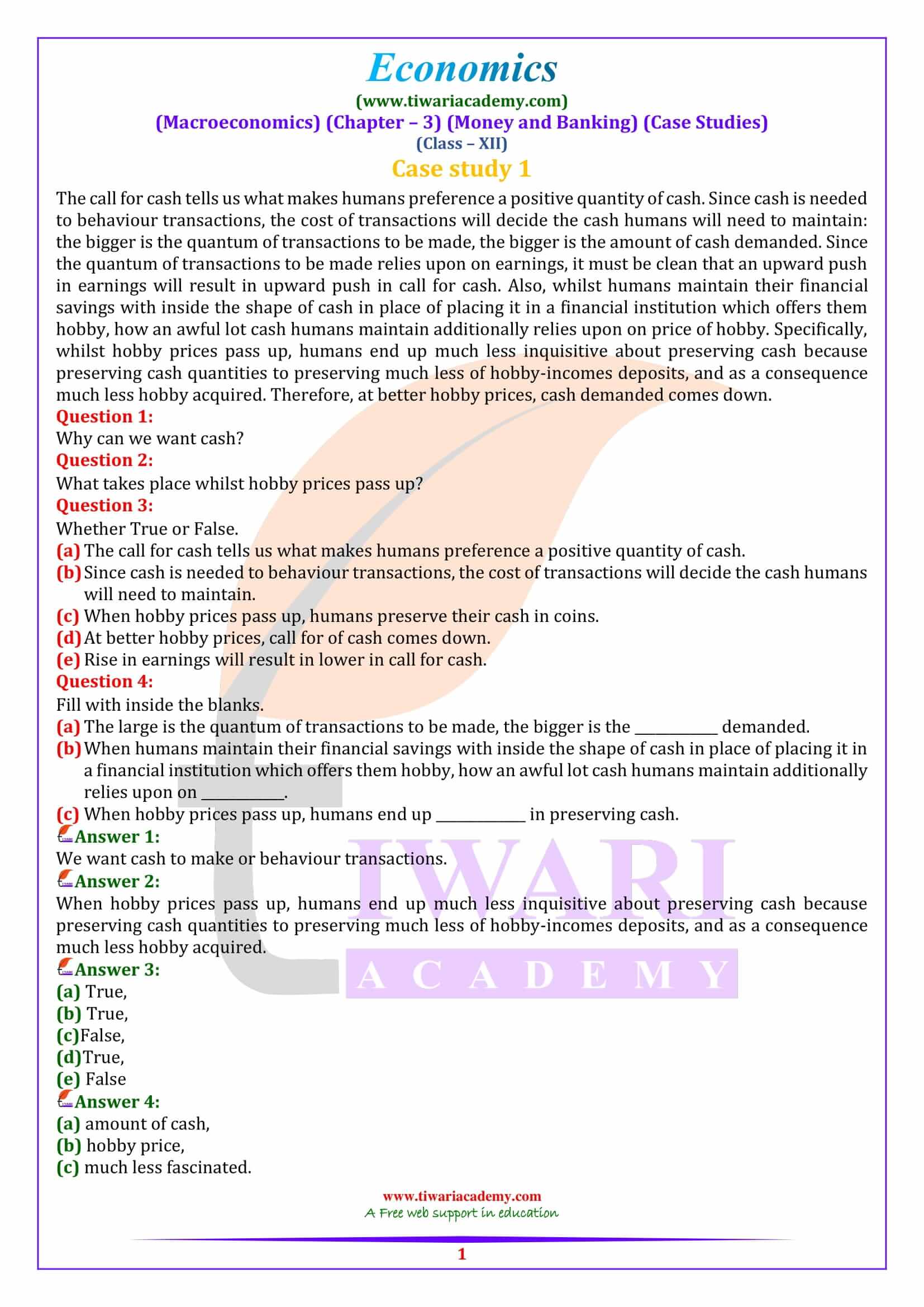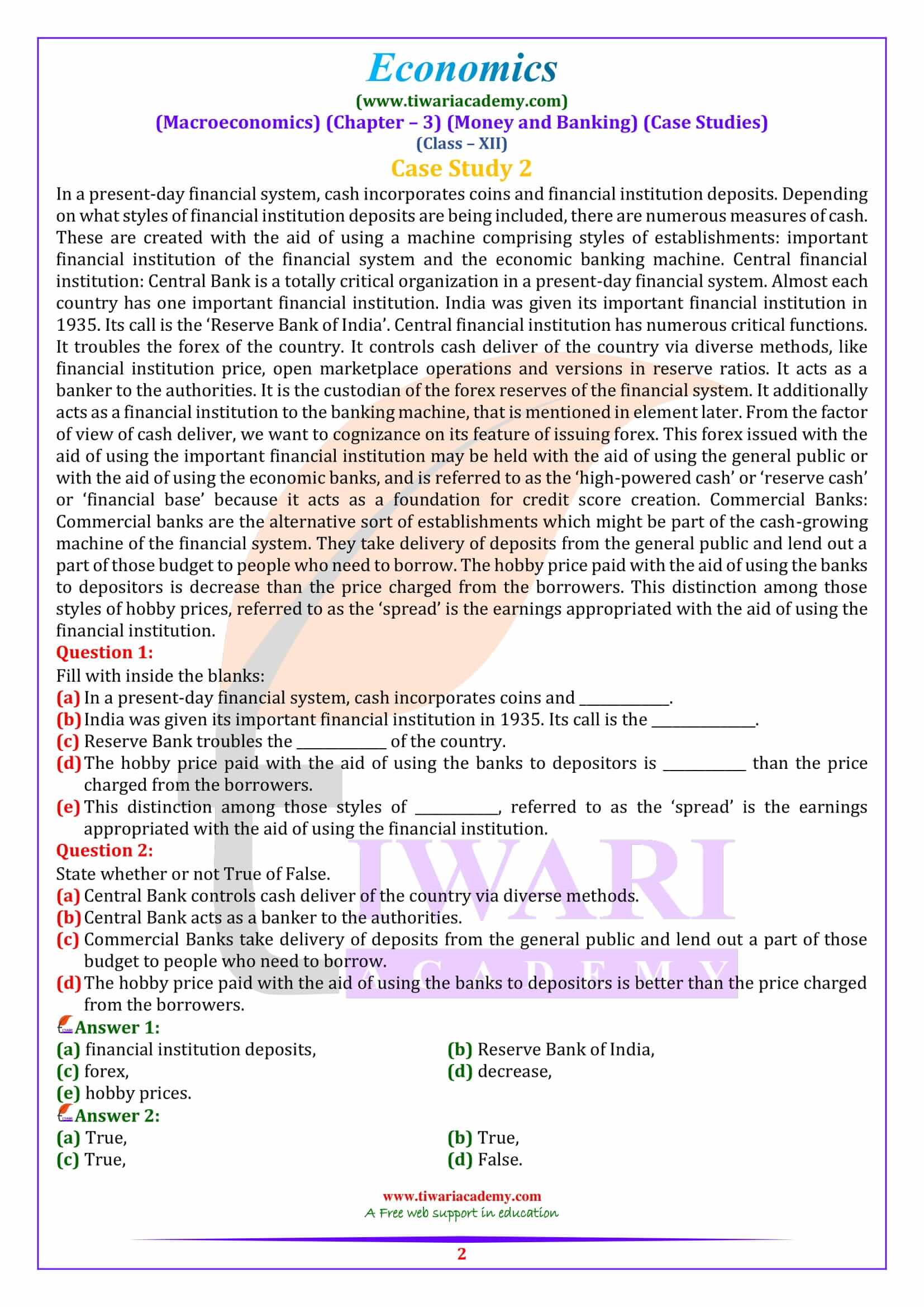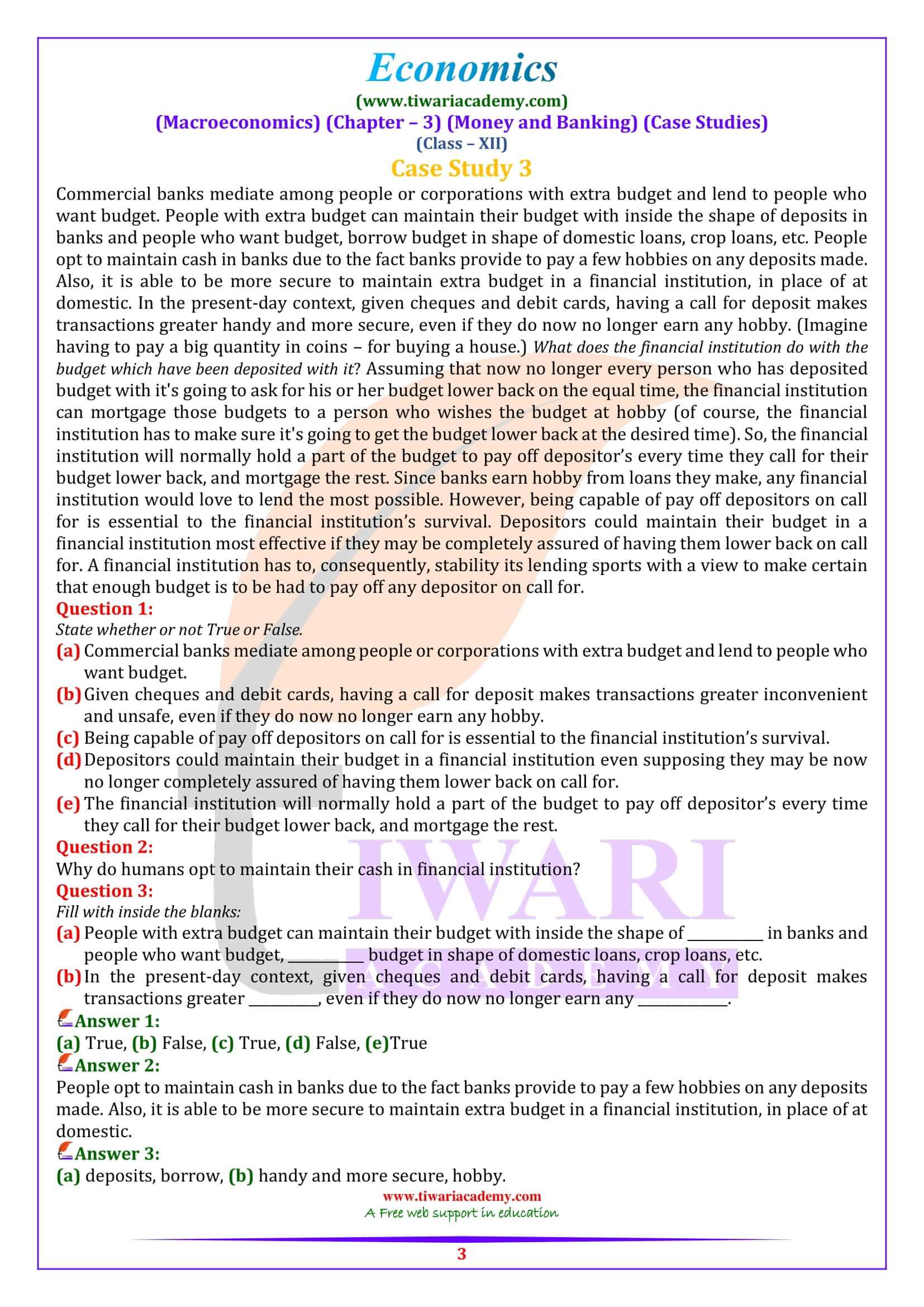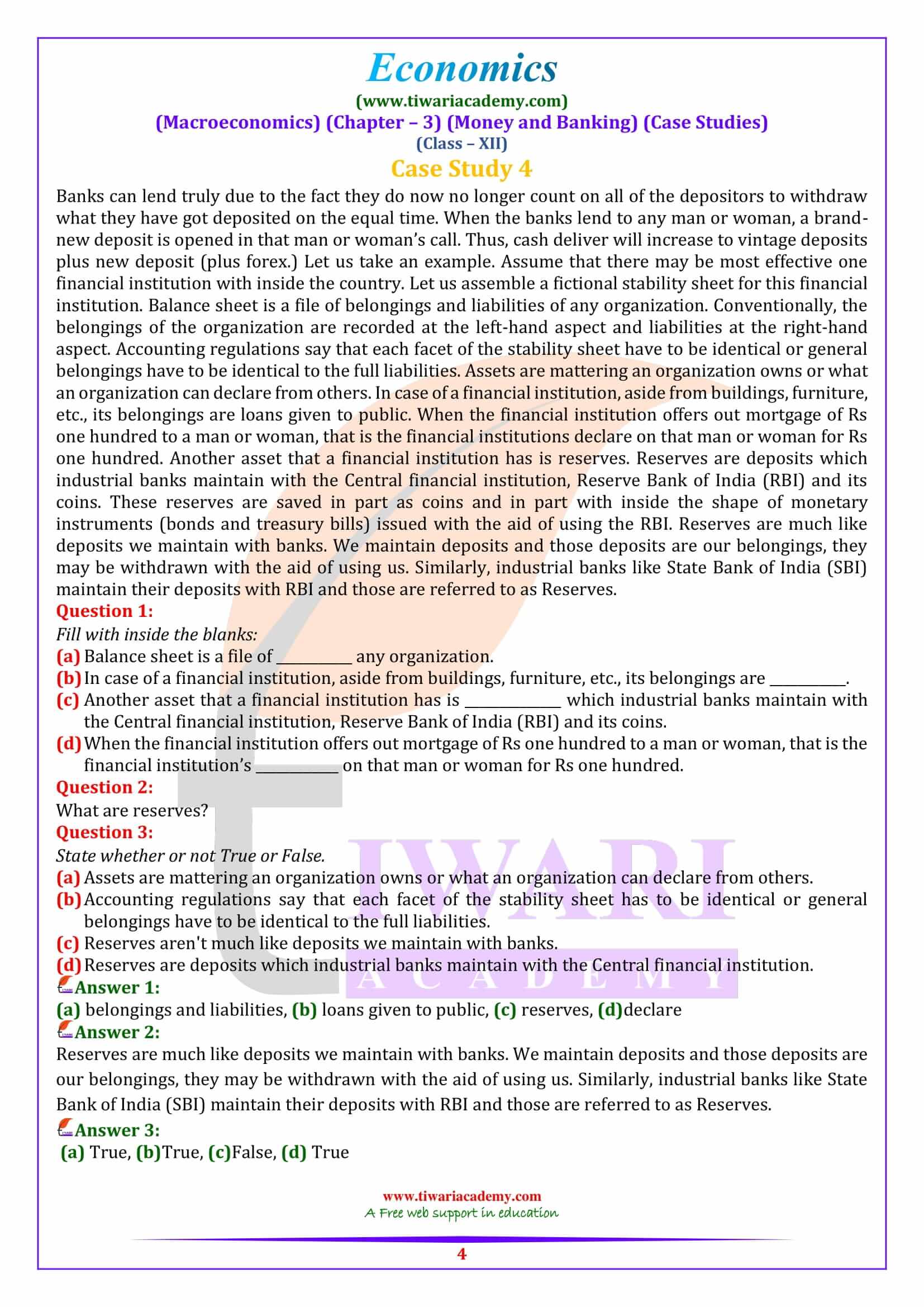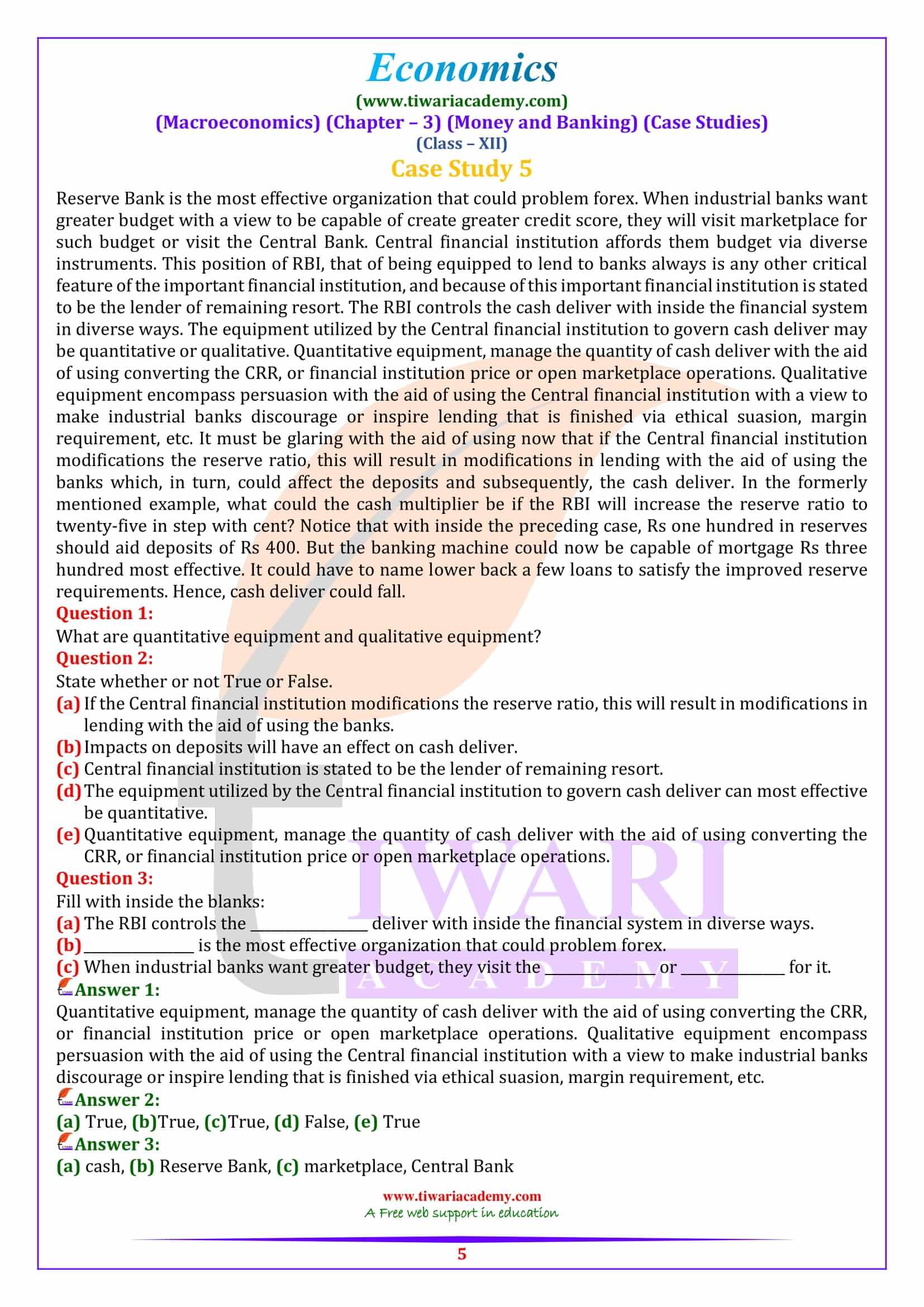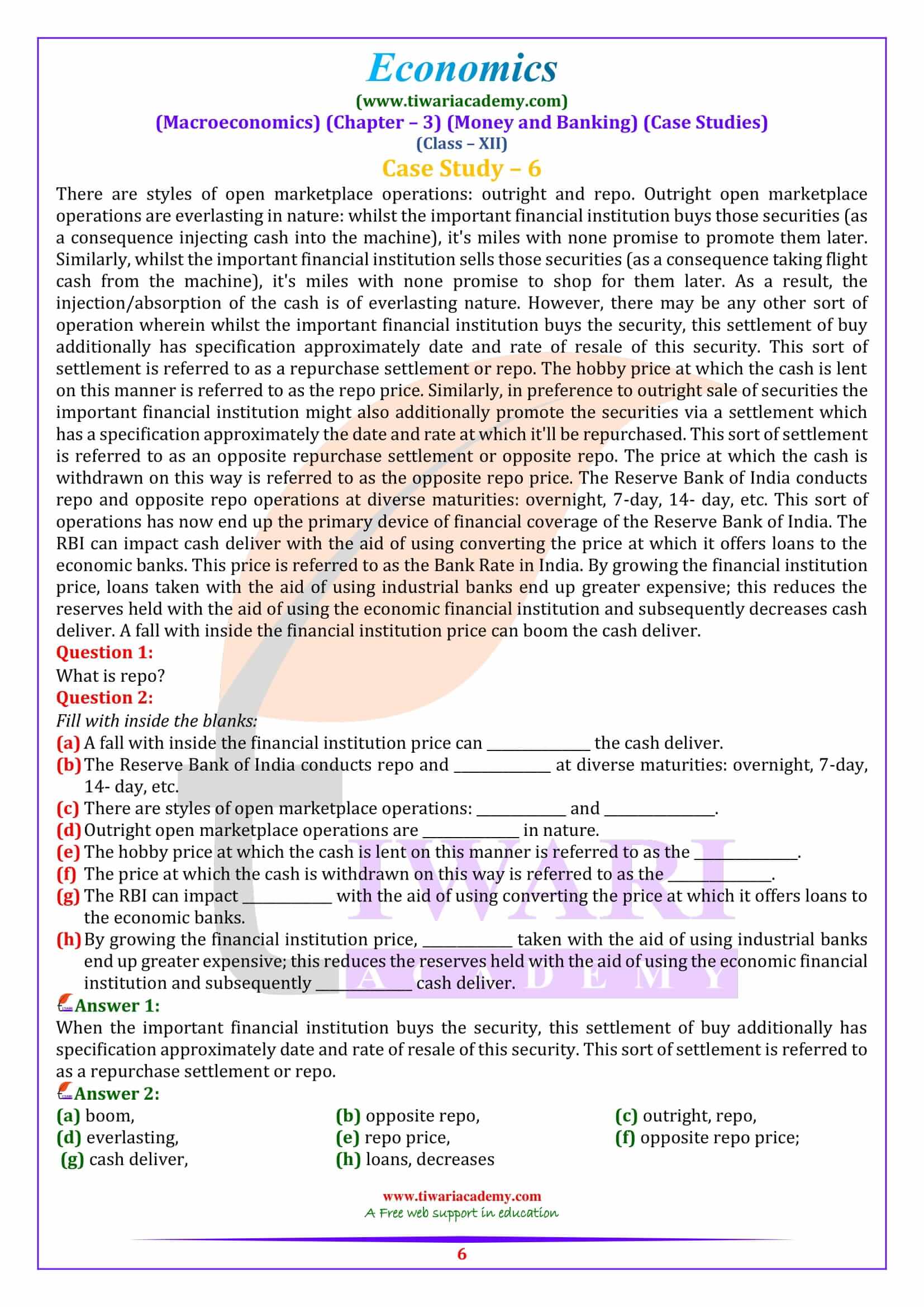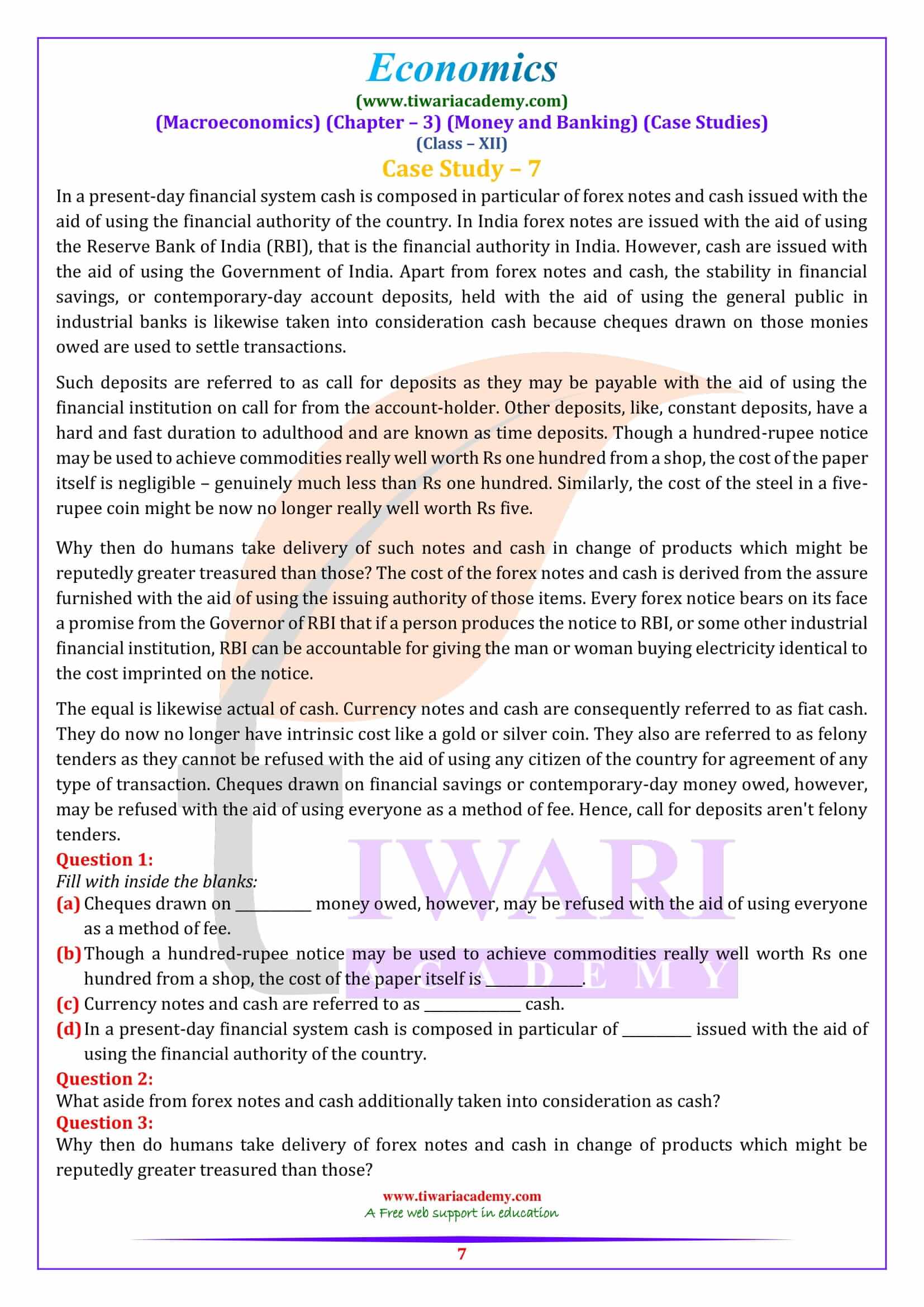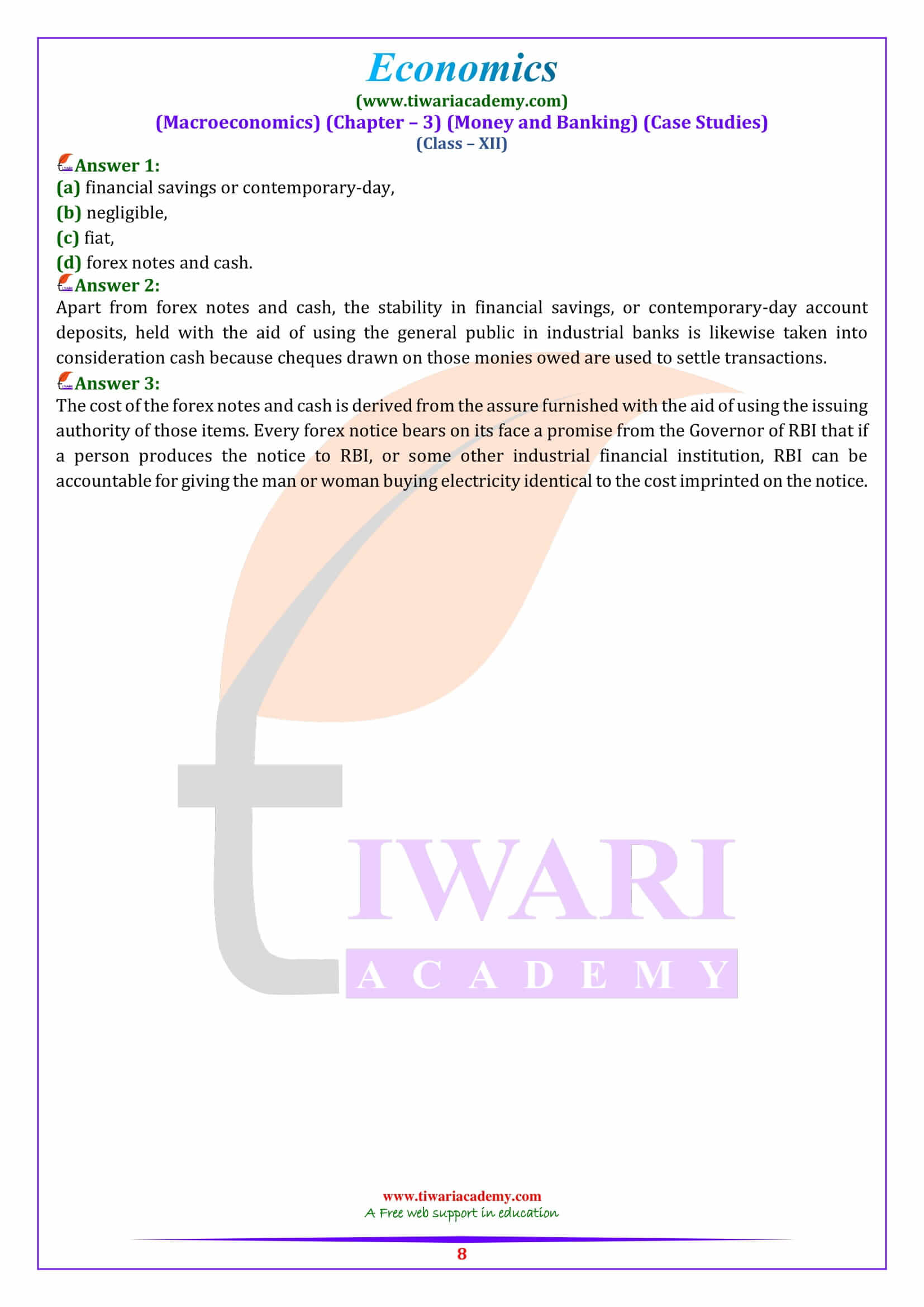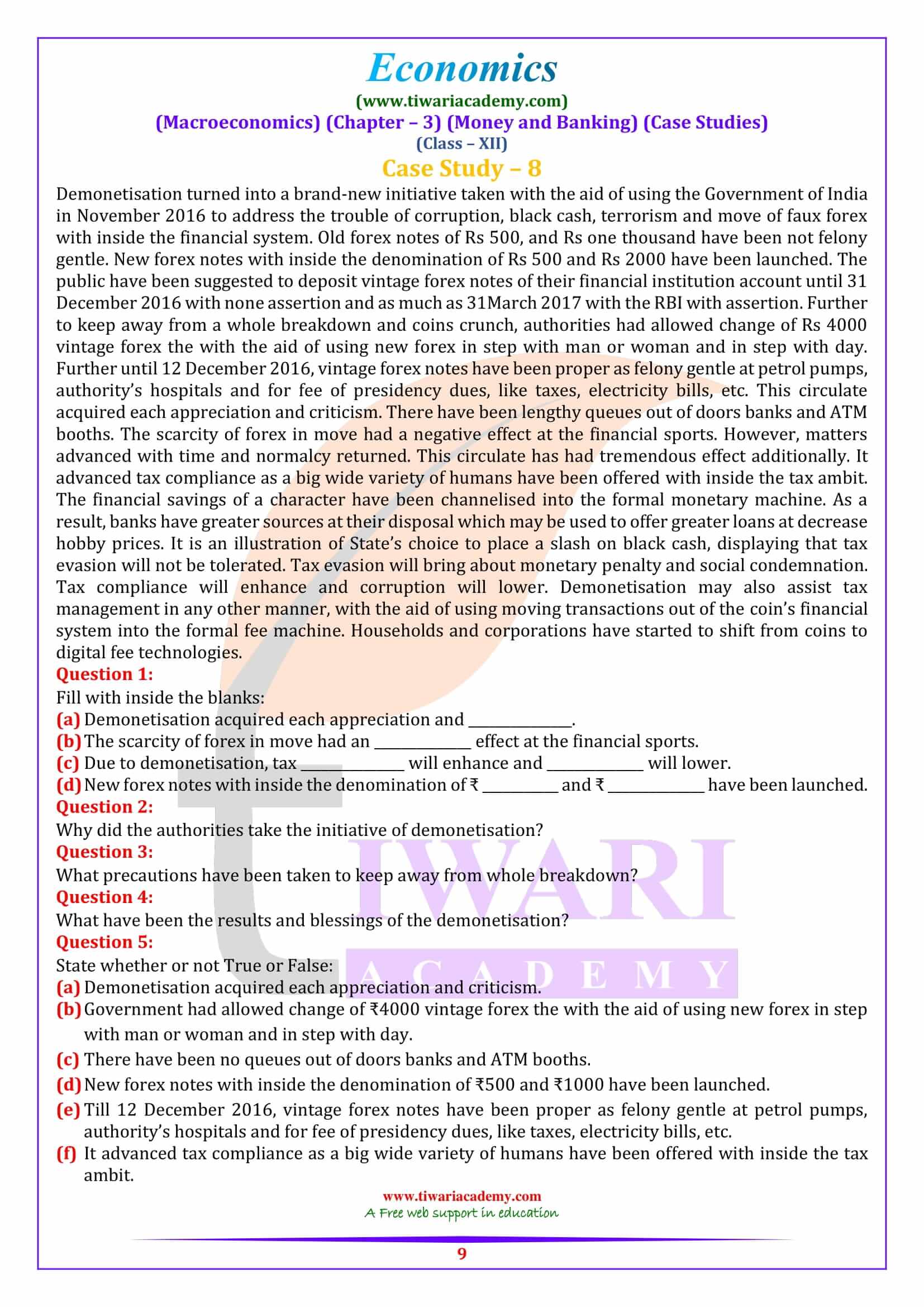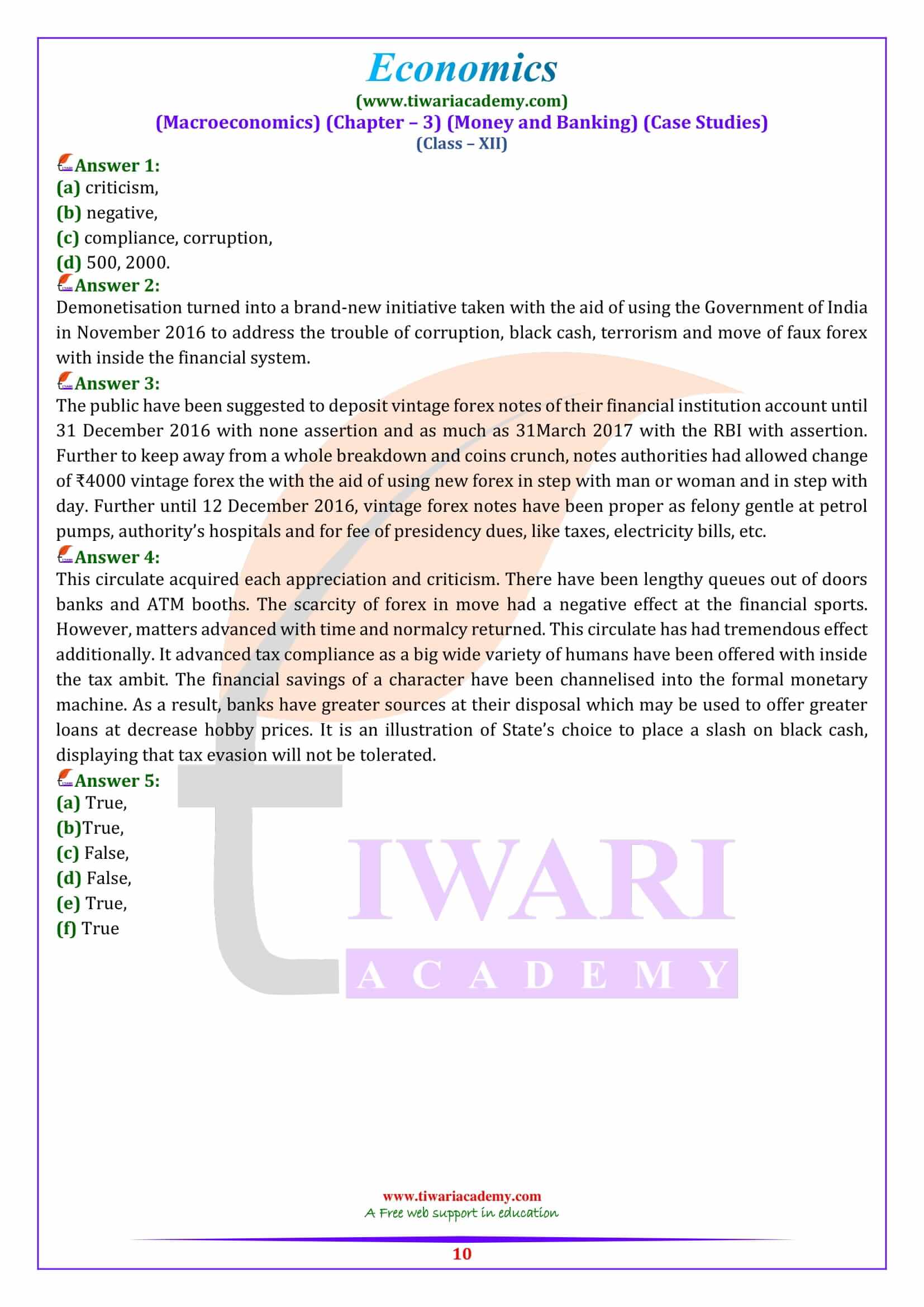NCERT Solutions for Class 12 Macroeconomics Chapter 3 Case Study Questions in English Medium prepared for academic session 2025-26. Students of class 12 economics can get here chapter 3 Money and Banking Case Study MCQ with Case based questions for practice in Case Studies during the exams.
Class 12 Macroeconomics Chapter 3 Case Studies Question Answers
Class 12 Macroeconomics Chapter 3 Case Study: 1
The call for cash tells us what makes humans preference a positive quantity of cash. Since cash is needed to behaviour transactions, the cost of transactions will decide the cash humans will need to maintain: the bigger is the quantum of transactions to be made, the bigger is the amount of cash demanded. Since the quantum of transactions to be made relies upon on earnings, it must be clean that an upward push in earnings will result in upward push in call for cash.
Also, whilst humans maintain their financial savings with inside the shape of cash in place of placing it in a financial institution which offers them hobby, how an awful lot cash humans maintain additionally relies upon on price of hobby. Specifically, whilst hobby prices pass up, humans end up much less inquisitive about preserving cash because preserving cash quantities to preserving much less of hobby-incomes deposits, and as a consequence much less hobby acquired. Therefore, at better hobby prices, cash demanded comes down.
- Question 1:
Why can we want cash? - Question 2:
What takes place whilst hobby prices pass up? - Question 3:
Whether True or False.
(a) The call for cash tells us what makes humans preference a positive quantity of cash.
(b) Since cash is needed to behaviour transactions, the cost of transactions will decide the cash humans will need to maintain.
(c) When hobby prices pass up, humans preserve their cash in coins.
(d) At better hobby prices, call for of cash comes down.
(e) Rise in earnings will result in lower in call for cash. - Question 4:
Fill with inside the blanks.
(a) The large is the quantum of transactions to be made, the bigger is the ____________ demanded.
(b) When humans maintain their financial savings with inside the shape of cash in place of placing it in a financial institution which offers them hobby, how an awful lot cash humans maintain additionally relies upon on ____________.
(c) When hobby prices pass up, humans end up _____________ in preserving cash.
- Answer 1:
We want cash to make or behaviour transactions. - Answer 2:
When hobby prices pass up, humans end up much less inquisitive about preserving cash because preserving cash quantities to preserving much less of hobby-incomes deposits, and as a consequence much less hobby acquired. - Answer 3:
(a) True,
(b) True,
(c)False,
(d)True,
(e) False - Answer 4:
(a) amount of cash,
(b) hobby price,
(c) much less fascinated.
Class 12 Macroeconomics Chapter 3 Case Study: 2
In a present-day financial system, cash incorporates coins and financial institution deposits. Depending on what styles of financial institution deposits are being included, there are numerous measures of cash. These are created with the aid of using a machine comprising styles of establishments: important financial institution of the financial system and the economic banking machine. Central financial institution: Central Bank is a totally critical organization in a present-day financial system. Almost each country has one important financial institution. India was given its important financial institution in 1935. Its call is the ‘Reserve Bank of India’. Central financial institution has numerous critical functions. It troubles the Forex of the country. It controls cash deliver of the country via diverse methods, like financial institution price, open marketplace operations and versions in reserve ratios. It acts as a banker to the authorities. It is the custodian of the Forex reserves of the financial system. It additionally acts as a financial institution to the banking machine, that is mentioned in element later.
From the factor of view of cash deliver, we want to cognizance on its feature of issuing Forex. This issued with the aid of using the important financial institution may be held with the aid of using the general public or with the aid of using the economic banks, and is referred to as the ‘high-powered cash’ or ‘reserve cash’ or ‘financial base’ because it acts as a foundation for credit score creation. Commercial Banks: Commercial banks are the alternative sort of establishments which might be part of the cash-growing machine of the financial system. They take delivery of deposits from the general public and lend out a part of those budget to people who need to borrow. The hobby price paid with the aid of using the banks to depositors is decrease than the price charged from the borrowers. This distinction among those styles of hobby prices, referred to as the ‘spread’ is the earnings appropriated with the aid of using the financial institution.
- Question 1:
Fill with inside the blanks:
(a) In a present-day financial system, cash incorporates coins and _________.
(b) India was given its important financial institution in 1935. Its call is the ________.
(c) Reserve Bank troubles the _________ of the country.
(d) The hobby price paid with the aid of using the banks to depositors is ____________ than the price charged from the borrowers.
(e) This distinction among those styles of ________, referred to as the ‘spread’ is the earnings appropriated with the aid of using the financial institution. - Question 2:
State whether or not True of False.
(a) Central Bank controls cash deliver of the country via diverse methods.
(b) Central Bank acts as a banker to the authorities.
(c) Commercial Banks take delivery of deposits from the general public and lend out a part of those budget to people who need to borrow.
(d) The hobby price paid with the aid of using the banks to depositors is better than the price charged from the borrowers.
- Answer 1:
(a) financial institution deposits, (b) Reserve Bank of India,
(c) Forex, (d) decrease,
(e) hobby prices. - Answer 2:
(a) True, (b) True,
(c) True, (d) False.
Class 12 Macroeconomics Chapter 3 Case Study: 3
Banks can lend truly due to the fact they do now no longer count on all of the depositors to withdraw what they have got deposited on the equal time. When the banks lend to any man or woman, a brand-new deposit is opened in that man or woman’s call. Thus, cash deliver will increase to vintage deposits plus new deposit (plus Forex.) Let us take an example. Assume that there may be most effective one financial institution with inside the country. Let us assemble a fictional stability sheet for this financial institution. Balance sheet is a file of belongings and liabilities of any organization. Conventionally, the belongings of the organization are recorded at the left-hand aspect and liabilities at the right-hand aspect. Accounting regulations say that each facet of the stability sheet have to be identical or general belongings have to be identical to the full liabilities. Assets are mattering an organization owns or what an organization can declare from others. In case of a financial institution, aside from buildings, furniture, etc., its belongings are loans given to public.
When the financial institution offers out mortgage of Rs one hundred to a man or woman, that is the financial institutions declare on that man or woman for Rs one hundred. Another asset that a financial institution has is reserves. Reserves are deposits which industrial banks maintain with the Central financial institution, Reserve Bank of India (RBI) and its coins. These reserves are saved in part as coins and in part with inside the shape of monetary instruments (bonds and treasury bills) issued with the aid of using the RBI. Reserves are much like deposits we maintain with banks. We maintain deposits and those deposits are our belongings, they may be withdrawn with the aid of using us. Similarly, industrial banks like State Bank of India (SBI) maintain their deposits with RBI and those are referred to as Reserves.
- Question 1:
Fill with inside the blanks:
(a) Balance sheet is a file of ___________ any organization.
(b) In case of a financial institution, aside from buildings, furniture, etc., its belongings are ___________.
(c) Another asset that a financial institution has is ______________ which industrial banks maintain with the Central financial institution, Reserve Bank of India (RBI) and its coins.
(d) When the financial institution offers out mortgage of Rs one hundred to a man or woman, that is the financial institution’s ____________ on that man or woman for Rs one hundred. - Question 2:
What are reserves? - Question 3:
State whether or not True or False.
(a) Assets are mattering an organization owns or what an organization can declare from others.
(b) Accounting regulations say that each facet of the stability sheet has to be identical or general belongings have to be identical to the full liabilities.
(c) Reserves aren’t much like deposits we maintain with banks.
(d) Reserves are deposits which industrial banks maintain with the Central financial institution.
- Answer 1:
(a) belongings and liabilities, (b) loans given to public, (c) reserves, (d)declare - Answer 2:
Reserves are much like deposits we maintain with banks. We maintain deposits and those deposits are our belongings, they may be withdrawn with the aid of using us. Similarly, industrial banks like State Bank of India (SBI) maintain their deposits with RBI and those are referred to as Reserves. - Answer 3:
(a) True, (b)True, (c)False, (d) True.
Class 12 Macroeconomics Chapter 3 Case Study: 4
There are styles of open marketplace operations: outright and repo. Outright open marketplace operations are everlasting in nature: whilst the important financial institution buys those securities (as a consequence injecting cash into the machine), it’s miles with none promise to promote them later. Similarly, whilst the important financial institution sells those securities (as a consequence taking flight cash from the machine), it’s miles with none promise to shop for them later. As a result, the injection/absorption of the cash is of everlasting nature. However, there may be any other sort of operation wherein whilst the important financial institution buys the security, this settlement of buy additionally has specification approximately date and rate of resale of this security. This sort of settlement is referred to as a repurchase settlement or repo. The hobby price at which the cash is lent on this manner is referred to as the reporate. Similarly, in preference to outright sale of securities the important financial institution might also additionally promote the securities via a settlement which has a specification approximately the date and rate at which it’ll be repurchased. This sort of settlement is referred to as an opposite repurchase settlement or opposite repo.
The price at which the cash is withdrawn on this way is referred to as the opposite reporate. The Reserve Bank of India conducts repo and opposite repo operations at diverse maturities: overnight, 7-day, 14- day, etc. This sort of operations has now end up the primary device of financial coverage of the Reserve Bank of India. The RBI can impact cash deliver with the aid of using converting the price at which it offers loans to the economic banks. This price is referred to as the Bank Rate in India. By growing the financial institution price, loans taken with the aid of using industrial banks end up greater expensive; this reduces the reserves held with the aid of using the economic financial institution and subsequently decreases cash deliver. A fall with inside the financial institution price can boom the cash deliver.
- Question 1:
What is repo? - Question 2:
Fill with inside the blanks:
(a) A fall with inside the financial institution price can _______ the cash deliver.
(b) The Reserve Bank of India conducts repo and _______ at diverse maturities: overnight, 7-day, 14- day, etc.
(c) There are styles of open marketplace operations: ________ and _________.
(d) Outright open marketplace operations are __________ in nature.
(e) The hobby price at which the cash is lent on this manner is referred to as the _______.
(f) The price at which the cash is withdrawn on this way is referred to as the ________.
(g) The RBI can impact _________ with the aid of using converting the price at which it offers loans to the economic banks.
(h) By growing the financial institution price, ________ taken with the aid of using industrial banks end up greater expensive; this reduces the reserves held with the aid of using the economic financial institution and subsequently ________ cash deliver.
- Answer 1:
When the important financial institution buys the security, this settlement of buy additionally has specification approximately date and rate of resale of this security. This sort of settlement is referred to as a repurchase settlement or repo. - Answer 2:
(a) boom, (b) opposite repo, (c) outright, repo,
(d) everlasting, (e) reporate, (f) opposite reporate;
(g) cash deliver, (h) loans, decreases
Class 12 Macroeconomics Chapter 3 Case Study: 5
Demonetisation turned into a brand-new initiative taken with the aid of using the Government of India in November 2016 to address the trouble of corruption, black cash, terrorism and move of faux forex with inside the financial system. Old notes of Rs 500, and Rs one thousand have been not felony gentle. New notes with inside the denomination of Rs 500 and Rs 2000 have been launched. The public have been suggested to deposit vintage notes of their financial institution account until 31 December 2016 with none assertion and as much as 31March 2017 with the RBI with assertion. Further to keep away from a whole breakdown and coins crunch, authorities had allowed change of Rs 4000 vintage forex the with the aid of using new forex in step with man or woman and in step with day. Further until 12 December 2016, vintage notes have been proper as felony gentle at petrol pumps, authority’s hospitals and for fee of presidency dues, like taxes, electricity bills, etc. This circulate acquired each appreciation and criticism. There have been lengthy queues out of doors banks and ATM booths. The scarcity of forex in move had a negative effect at the financial sports.
However, matters advanced with time and normalcy returned. This circulate has had tremendous effect additionally. It advanced tax compliance as a big wide variety of humans have been offered with inside the tax ambit. The financial savings of a character have been channelised into the formal monetary machine. As a result, banks have greater sources at their disposal which may be used to offer greater loans at decrease hobby prices. It is an illustration of State’s choice to place a slash on black cash, displaying that tax evasion will not be tolerated. Tax evasion will bring about monetary penalty and social condemnation. Tax compliance will enhance and corruption will lower. Demonetisation may also assist tax management in any other manner, with the aid of using moving transactions out of the coin’s financial system into the formal fee machine. Households and corporations have started to shift from coins to digital fee technologies.
- Question 1:
Fill with inside the blanks:
(a) Demonetisation acquired each appreciation and _______.
(b) The scarcity of forex in move had an _________ effect at the financial sports.
(c) Due to demonetisation, tax __________ will enhance and ________ will lower.
(d) New forex notes with inside the denomination of ₹ ___________ and ₹ _________ have been launched. - Question 2:
Why did the authorities take the initiative of demonetisation? - Question 3:
What precautions have been taken to keep away from whole breakdown? - Question 4:
What have been the results and blessings of the demonetisation? - Question 5:
State whether or not True or False:
(a) Demonetisation acquired each appreciation and criticism.
(b) Government had allowed change of ₹4000 vintage forex the with the aid of using new forex in step with man or woman and in step with day.
(c) There have been no queues out of doors banks and ATM booths.
(d) New forex notes with inside the denomination of ₹500 and ₹1000 have been launched.
(e) Till 12 December 2016, vintage forex notes have been proper as felony gentle at petrol pumps, authority’s hospitals and for fee of presidency dues, like taxes, electricity bills, etc.
(f) It advanced tax compliance as a big wide variety of humans have been offered with inside the tax ambit.
- Answer 1:
(a) criticism,
(b) negative,
(c) compliance, corruption,
(d) 500, 2000. - Answer 2:
Demonetisation turned into a brand-new initiative taken with the aid of using the Government of India in November 2016 to address the trouble of corruption, black cash, terrorism and move of faux forex with inside the financial system. - Answer 3:
The public have been suggested to deposit vintage notes of their financial institution account until 31 December 2016 with none assertion and as much as 31March 2017 with the RBI with assertion. Further to keep away from a whole breakdown and coins crunch, notes authorities had allowed change of ₹4000 vintage forex the with the aid of using new forex in step with man or woman and in step with day. Further until 12 December 2016, vintage forex notes have been proper as felony gentle at petrol pumps, authority’s hospitals and for fee of presidency dues, like taxes, electricity bills, etc. - Answer 4:
This circulate acquired each appreciation and criticism. There have been lengthy queues out of doors banks and ATM booths. The scarcity of forex in move had a negative effect at the financial sports. However, matters advanced with time and normalcy returned. This circulate has had tremendous effect additionally. It advanced tax compliance as a big wide variety of humans have been offered with inside the tax ambit. The financial savings of a character have been channelised into the formal monetary machine. As a result, banks have greater sources at their disposal which may be used to offer greater loans at decrease hobby prices. It is an illustration of State’s choice to place a slash on black cash, displaying that tax evasion will not be tolerated. - Answer 5:
(a) True,
(b)True,
(c) False,
(d) False,
(e) True,
(f) True.
